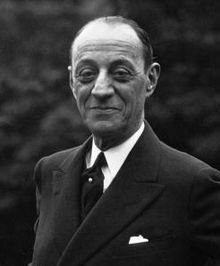Jesse I. Strauss
| Jesse I. Straus | |
|---|---|
 |
|
| United States Ambassador to France | |
|
In office 1933–1936 |
|
| President | Franklin D. Roosevelt |
| Preceded by | Walter Evans Edge |
| Succeeded by | William C. Bullitt |
| Personal details | |
| Born |
Jesse Isidor Straus June 25, 1872 |
| Died | October 4, 1936 (aged 64) |
| Political party | Democratic |
| Spouse(s) | Irma Nathan (1895-1936) (until his death) |
| Children | 1 |
| Religion | Judaism |
Jesse Isidor Straus (June 25, 1872 – October 4, 1936) served as the American ambassador to France from 1933 to 1936. He was the eldest son of Isidor Straus (1845–1912), who died in the sinking of the RMS Titanic, co-owner with his brother Nathan Straus of the department store R.H. Macy & Co. His uncle Oscar Solomon Straus (1850–1926) was the first Jewish United States Cabinet Secretary, serving as Secretary of Commerce and Labor from 1906 to 1909.
Jesse Straus was born Manhattan. He graduated from Harvard College in 1893. He and his brothers Percy and Herbert, both also Harvard graduates, donated funds that built Straus Hall in Harvard Yard.
After college Jesse Straus was made to gain outside business experience before joining the family business. He worked as a clerk at the Manufacturers Hanover Corporation for a year and a half and then for a similar period as a department store salesman at Abraham & Straus, a Macy's rival. He married Irma Nathan in 1895. He began working at Macy's on September 3, 1896.
In 1929, he purchased a piece of land on New York City's Park Avenue to construct an apartment building because he found that the better buildings in the area would not accept Jews as residents. He moved his family into the topmost two floors, a seven-bedroom duplex with terraces, a thousand-square-foot library, and a baronial stone fireplace.
A political ally of New York Governor Franklin D. Roosevelt, in March 1931, Jesse Straus funded a poll of the delegates to the 1928 Democratic Convention to assess Roosevelt's chances in the race for the 1932 Democratic presidential nomination. Straus was president of his family's department store in the 1930s until Roosevelt appointed him Chairman of the state's Temporary Emergency Relief Administration (TERA), which provided unemployment assistance to ten percent of New York's families, in 1931.
...
Wikipedia
